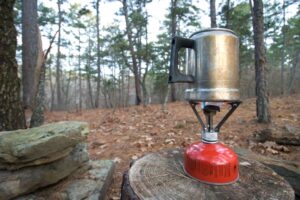A camp stove is a lifesaver when boondocking in an RV. After all, roasting hot dogs over the fire loses its novelty after a while. However, when shopping for a camp stove, you must carefully consider your fuel source. Butane and propane are two popular options, but which is better for your camp stove?
Butane and propane have preferred uses in different scenarios, with propane preferable at higher elevations and colder temperatures. Use butane in warmer (but not sweltering) weather at lower elevations. Butane comes in lightweight containers that are easier to bring on an RV.
This article will examine propane and butane for camping stoves, including the pros and cons for each, so you can select the right fuel source for your motorhome adventures.
Butane and Propane for a Camp Stove – How Are They Different?

Let’s get underway by reviewing the differences between propane and butane, beginning with a short explanation of both camp stove fuel sources.
Butane is a type of alkane characterized by its colorlessness. It’s a gas that effortlessly liquefies, and room-temperature conditions can cause it to vaporize. Since it’s so flammable, butane is often used as a refrigerant, heating fuel, aerosol propellant, and portable stove fuel source.
Of the two, you’re likely more familiar with propane. This is also an alkane with three carbon chains. It remains in a gaseous state at room temperature but heats up to a liquid with enough pressure. Propane has chemical, industrial, and cooking applications, including its use as a heat source for stoves.
Besides the chemical composition of the two fuel sources, another way in which they’re different is their boiling points. Propane has a boiling point of -44 degrees Fahrenheit, while it’s 30.2 degrees for butane.
Propane is sufficient for cold temperatures and higher elevations. You can camp with this fuel source in the winter and boondock without worrying about how the propane will hold up.
However, you can’t do the same with butane. It doesn’t operate well in the cold, so it’s better off kept in a motorhome or another environment with climate control.
The Pros and Cons of Butane for Camp Stoves
In this section and the next, I’ll guide you toward a decision for your camp stove by revealing the benefits and downsides of these two fuel sources, beginning with butane.
The Advantages of Using Butane

Butane’s biggest benefit is how fast it begins burning. It ignites instantly when it comes into contact with a fuel source, and its heat output result is as instantaneous. You won’t have to wait at all to begin using your camp stove, which is good if you’re hungry.
You can count on butane in warm environments. It’s also green in a variety of ways. For example, it’s a cleaner-burning fuel source compared to propane, and it releases more energy.
Butane is also easy to use and cost-effective.
The Disadvantages of Using Butane
The biggest reason to steer away from butane is its inability to burn effectively in cold climates.
Butane is a dangerous gas if exposed in an enclosed environment. You could develop frostbite on the skin, nervous system depression, asphyxia, drowsiness, cardiac arrhythmia, and narcosis if inhaled in large enough quantities.
The Pros and Cons of Propane for Camp Stoves

Next, let’s examine propane and its application in camp stoves for your RV.
The Advantages of Using Propane
Like butane, propane burns expediently. You can begin cooking fast when using it to fuel your camp stove. Propane is a nontoxic, clean fuel source, and most propane-driven systems have a lesser need for maintenance because of it.
Many appliances use propane, so if you have some left over after running your camp stove, you can transition the fuel to the rest of your motorhome appliances.
Propane is also available in large canisters, so you only need a canister or two to last you for a while.
The Disadvantages of Using Propane
However, I must make one point clear. Large canisters are great for stocking up, but they’re not so convenient for porting around. The size and heft of propane canisters will have you longing for the streamlined butane canister by comparison.
Propane is also expensive. Between oil and propane, the latter generates less heat, which is another definite issue.
Butane vs. Propane – How They Stack Up
You now know the ins and outs of propane and butane, but it’s time to decide once and for all which is the suitable fuel source for your camp stove. Let’s see how they compare in the following areas.
Safety
Neither fuel source is necessarily safer than the other. They’re both nontoxic and burn clean, igniting fast. Proper storage and usage go a long way toward making propane and butane safe.
Weight
Propane canisters outweigh butane by a significant margin. Butane is stored in aluminum canisters that are smaller and more streamlined. You can easily lug the canisters onto your motorhome without breaking your back.
You can carry a propane canister yourself, but not without effort. The laboriousness of transport doesn’t make it as convenient to take propane canisters on an RV, even if they will last longer because there’s more fuel inside.
Price
Fuel is pricy either way, but butane typically costs less.
Sustainability
Propane and butane are clean-burning fuel sources, but one is slightly better for our planet than the other, and that’s propane. It’s not so much the fuel source as the canister. You can often hold onto propane canisters and refill them until you’re done using the fuel.
Hold onto it until next season, refuel again, and eventually, you can recycle the canisters.
However, you often cannot recycle butane. What’s worse, you can’t reuse the canisters, so they certainly contribute to landfill piles across the country.
Longevity
You don’t want to have to continually relight your camp stove because the fuel source burned out. Your food will come out uneven, and it’s also majorly inconvenient.
Butane has more energy by its volume, which equates to using less fuel for each burn. The butane canister might not be as large, but it burns 12 percent more than the same portion of propane.
Altitude
Greater altitudes lead to reduced oxygen and air pressure, which diminishes how well butane works. Your camp stove won’t operate at elevations between 5,000 and 10,000 feet if you use butane.
You might not go that high up into the mountains in an RV, but if you do, this is valuable information to know.
Propane can withstand higher altitudes and operate efficiently.
Temperature
Butane requires a boiling point of approximately 30.2 degrees. If it’s colder than that, it won’t ignite, which means no camp stove and no warm dinner. Propane’s boiling point is in the negatives, so cold temperatures won’t affect it.
You can use propane in temperatures far greater than what any person would be capable of withstanding.
Iso-Propane – The Answer to Your Problems?
I’d be remiss not to mention Iso-Propane or IsoProp, a combination propane and butane fuel source. IsoProp can withstand higher elevations and lower temperatures than butane and last longer than propane. It also comes in lightweight canisters.
However, each manufacturer can use its own ratio of propane to butane. Iso-Propane that has 80 percent butane and 20 percent propane will contain more butane properties, and vice-versa for a formula that’s 80 percent propane.
IsoProp works best when it contains a more even amount of fuel sources. However, even with a higher concentration of one over the other, it’s still a viable choice if you’re stuck between options.
Bottom Line
Fueling a camp stove with propane is recommended when RV camping at higher elevations and lower temperatures. Butane works best at standard elevations and temperatures over 30.2 degrees.
Still can’t decide? IsoProp combines the best traits of butane and propane so you can have your cake and eat it too.
